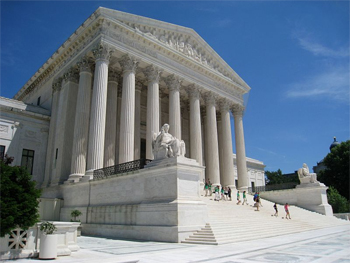Federalism and the Supreme Court 10 points

Among Congress’ enumerated powers is the power to regulate "commerce among the states" - interstates commerce. Over the years this clause has been used to extend the powers of Congress and the federal government. The Supreme Court has interpreted this clause to empower Congress to regulate any activity that impacts commerce, and has led to many changes in federal – state relations. Some laws passed under the implied powers and commerce clause include anti-trust acts, civil rights acts prohibiting discrimination, child labor laws, social security, Medicare and the American Disabilities Act. As you can see, these cover many areas of American life. Between 1937 and 1992 the Court repeatedly upheld expanded interpretations of federal power.
You have read in your text about Gibbons v. Ogden, the first commerce case. Over the years many other cases helped to define the relationship between the states and the federal government.
 |
Check out this list of Supreme Court cases dealing with issues of federalism from the Bill of Rights Institute. |
Go to the M1 Tasks Folder and complete the Federalism and the Supreme Court assignment.